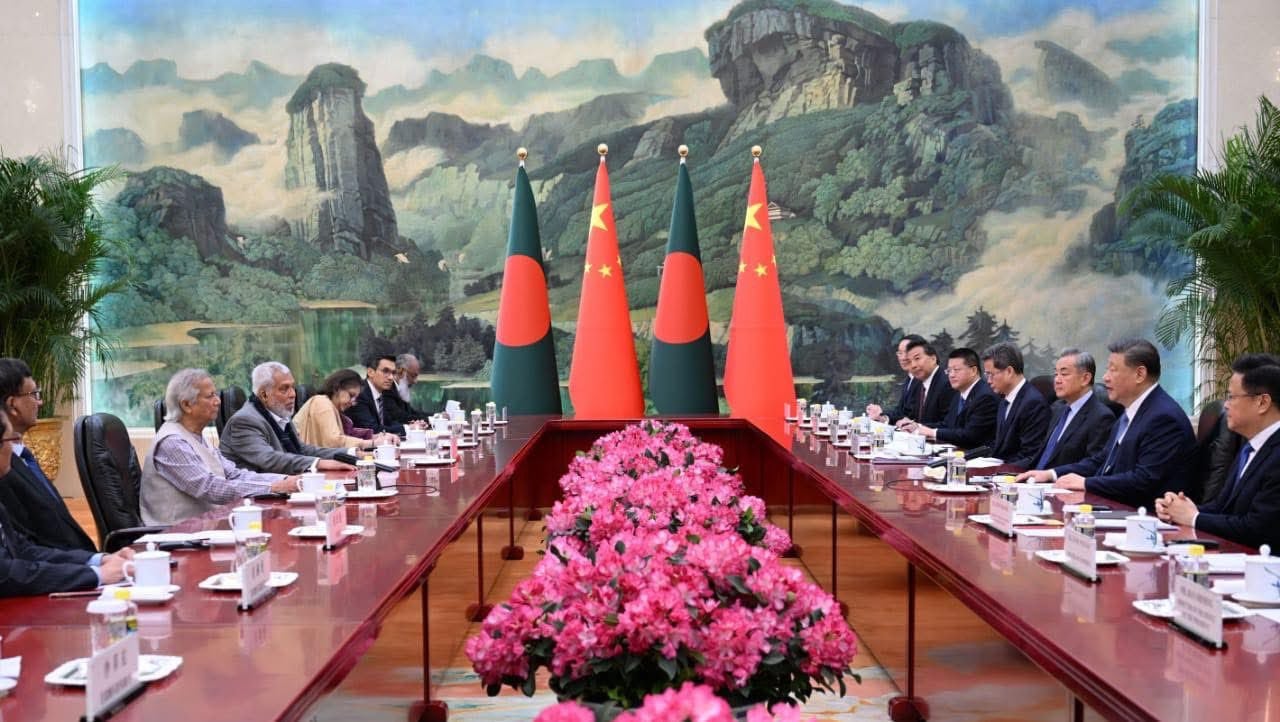Summary
During Muhammad Yunus’s visit to China in late March 2025, Bangladesh and China signed several agreements and memorandums of understanding to deepen their bilateral ties. On the other hand, the interim government has had limited engagement with India.
Muhammad Yunus, Chief Advisor to the interim Bangladesh government, was in China from 26 to 29 March 2025. He attended the Boao Forum for Asia Annual Conference 2025 in Hainan before visiting Beijing for official engagements. On Bangladesh-China ties, in an exclusive interview with Xinhua on 28 March 2025, Yunus said, “It’s very important that we see China as our good friend…Our relationship has been very strong over the years. Our business is very strong and we benefit from our collaboration with China”.
China has been Bangladesh’s largest trading partner for 15 consecutive years. Nearly 1,000 Chinese enterprises are operating in Bangladesh, which have created more than 550,000 jobs in the country. During Yunus’ visit, China and Bangladesh signed an agreement on economic and technical cooperation and eight memorandums of understandings, and made five announcements of cooperation on investment infrastructure and technology. The two sides also agreed to promote high-quality Belt and Road projects, signed the Agreement on Economic and Technical Cooperation, agreed on documents on cultural heritage, news exchange and media, sports and health sector, and decided to move forward in the China-Bangladesh Comprehensive Strategic Cooperative Partnership. Yunus secured a commitment of US$2.1 billion (S$2.8 billion) in investments, loans and grants from the Chinese government and private companies, including US$400 million (S$500 million) for Mongla Port, US$350 million ($369 million) for the Chinese Economic and Industrial Zone and US$150 million (S$201 million) for technical assistance.
Dhaka and Beijing appear to have come close to each other following the resignation of Sheikh Hasina as Bangladesh’s prime minister and her fleeing to India in August 2024. This was reflected in a series of recent visits and meetings between the two sides. A four-member Bangladesh Nationalist Party (BNP) delegation travelled to China at the invitation of the Communist Party of China in November 2024 while China’s Foreign Minister Wang Yi met Bangladesh’s Foreign Affairs Advisor Touhid Hossain earlier this year. In February 2025, a 22-member delegation from eight Bangladesh political parties went on a 13-day trip to China. The delegation included leaders from the BNP and its affiliated organisations, four representatives from Students Against Discrimination and members of the Jatiya Nagorik Committee.
Despite close ties, trade imbalance and interest repayment on loans remain significant issues for Bangladesh. The bilateral trade is China’s favour. In the July-December period of the current fiscal year, Bangladesh imported goods worth US$8.89 billion (S$11.93 billion) and exported goods valued at US$461.1 million (S$620 million).
China has provided total loans amounting to US$7.5 billion (S$10.1 billion) to Bangladesh since 1975. It is Bangladesh’s fourth-largest lender after Japan, the World Bank and the Asian Development Bank. During his visit to China, Hossain requested Wang Yi to lower the interest rate on Chinese loans from two to three per cent to one per cent, waive the commitment and management fees and extend the loan repayment period from 20 to 30 years for both the preferential buyer’s credit and government concessional loans. Wang Yi agreed to extend the maturity period for the loans and provided the assurance to look into the request of lowering the interest rate on the loans. Hossain also met with Luo Zhaohui, Chairman of the China International Development Cooperation Agency, and requested him to ramp up concessional loans and grants, to which the latter responded positively. During Yunus’ visit to China, Bangladesh reiterated its call to reduce interest rates for Chinese loans from three per cent to one to two per cent and to waive commitment fees for China-funded projects in the country.
Unlike China, Bangladesh’s ties with India have nosedived following the fall of Hasina, even though India’s Foreign Secretary Vikram Misri was in Dhaka in December 2024 and Indian Foreign Minister S Jaishankar met Hossain on the sideline of the eighth Indian Ocean Conference in Oman in February 2025. Since assuming office, Yunus has yet to meet India’s Prime Minister Narendra Modi. Yunus’s press secretary, Shafiqul Alam, told The Hindu that he wanted to visit India before going to China but did not receive a positive response from New Delhi. However, in a letter to Yunus on Bangladesh’s National Day on 26 March 2025, Modi greeted Yunus and stated “The spirit of the Liberation War of Bangladesh continues to remain a guiding light for our relationship…We remain committed to advancing this partnership, driven by our common aspirations for peace, stability, and prosperity, and based on mutual sensitivity to each other’s interests and concerns.” Having said that, it remains uncertain whether the two leaders will meet bilaterally during the Bay of Bengal Multi-Sectoral Technical and Economic Cooperation Summit in Bangkok on 3 and 4 April 2025.
Dhaka’s engagement with Beijing and New Delhi seem to be following different trajectories. Bangladesh has a litany of issues with India; the most serious being Hasina living in New Delhi where she has been making ‘problematic’ statements and displeasing the interim government. On the contrary, as of now, Bangladesh’s interim government has no serious political issues with China. Consequently, Bangladesh is engaging with China on several fronts while its dealing with India is limited.
. . . . .
Dr Amit Ranjan is a Research Fellow at the Institute of South Asian Studies (ISAS), an autonomous research institute at the National University of Singapore (NUS). He can be contacted at isasar@nus.edu.sg. The author bears full responsibility for the facts cited and opinions expressed in this paper.
Pic Credit: (7) Chief Adviser of the Government of Bangladesh (@ChiefAdviserGoB) / X
-
 More From :
More From :
-
 Tags :
Tags :
-
 Download PDF
Download PDF



